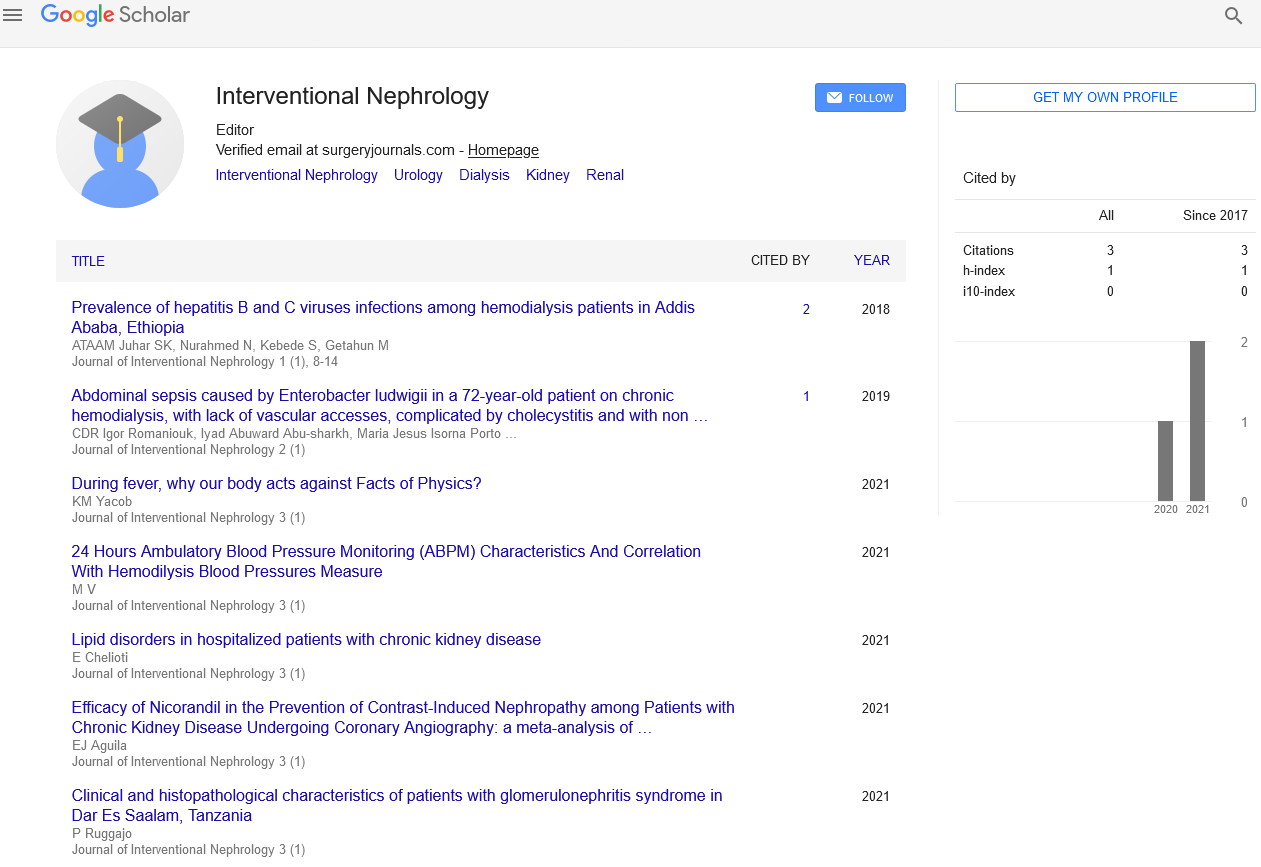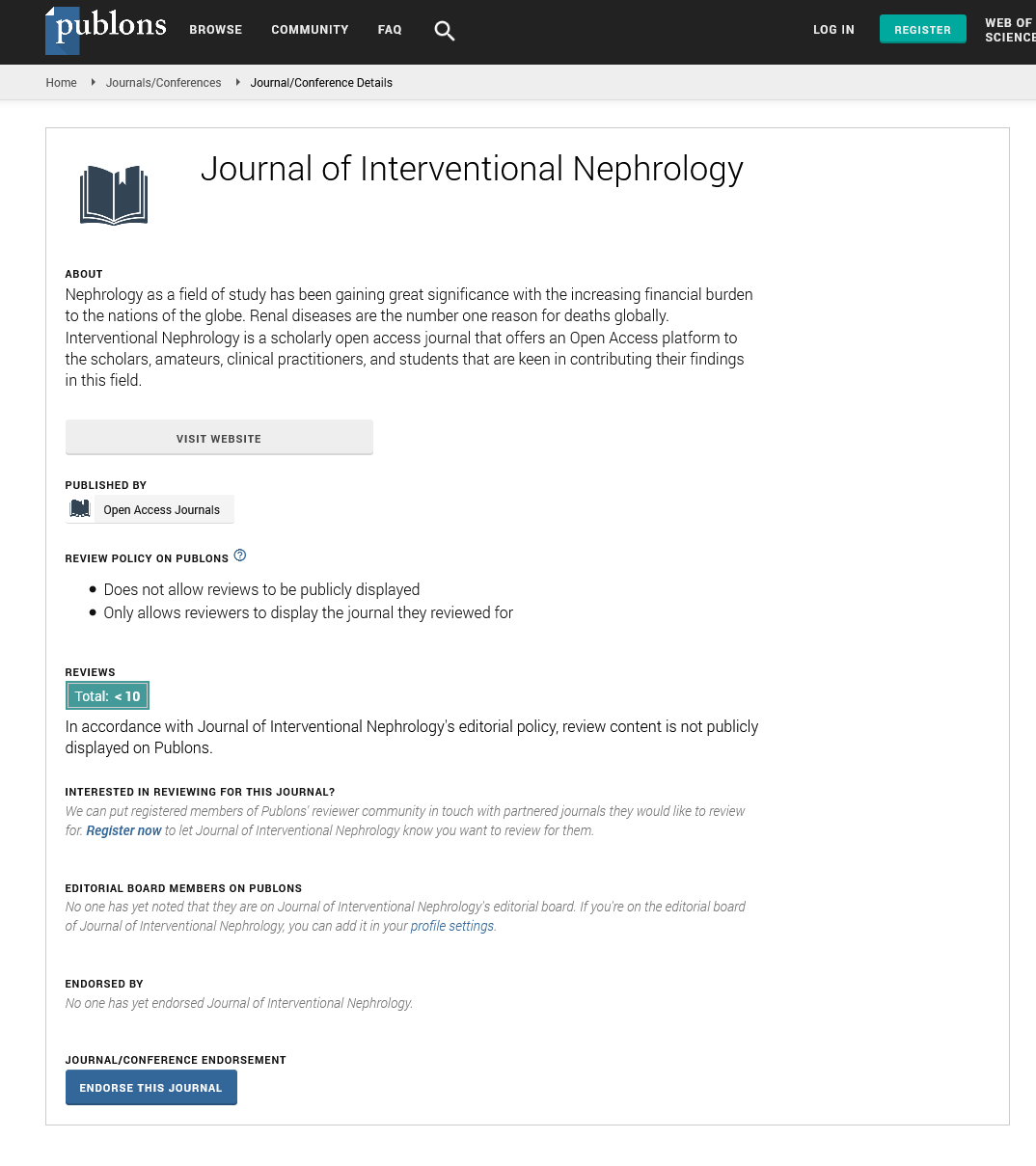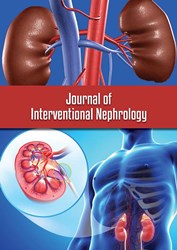Perspective - Journal of Interventional Nephrology (2024) Volume 7, Issue 2
KDIGO: Navigating the Guidelines for Kidney Disease
- Corresponding Author:
- Nicolas Blessy
Department of Nephrology,
Westcliff University,
Japan
E-mail: Nicolasblessy789dm@gmail.com
Received: 23-Jan-2024, Manuscript No. OAIN-24-125677; Editor assigned: 25-Jan-2024, PreQC No. OAIN-24-125677 (PQ); Reviewed: 08-Feb-2024, QC No. OAIN-24- 125677; Revised: 15-Feb-2024, Manuscript No. OAIN-24-125677 (R); Published: 23-Feb-2024, DOI: 10.47532/oain.2024.7(2).236-237
Abstract
Kidney disease: Improving global outcomes (KDIGO) stands as a beacon in the field of nephrology, providing comprehensive guidelines to enhance the care and management of kidney diseases worldwide. In this article, we delve into the origins of KDIGO, its mission, key focus areas, and the impact it has on shaping the landscape of kidney disease diagnosis, treatment, and prevention.
Keywords
Chronic Kidney Disease (CKD) ● Glomerulonephritis ● Diabetes ● Immunosuppressive therapy ● Transplantation
Introduction
Foundation and mission
Establishment: KDIGO was founded in 2003 as a global organization focused on kidney disease.
Collaborative initiative: A collaboration between the International Society of Nephrology (ISN) and the National Kidney Foundation (NKF).
Mission statement
Guidelines development: Creating evidencebased clinical practice guidelines for kidney disease.
Global impact: Improving outcomes and quality of life for individuals with kidney disease on a global scale.
Broad scope of influence
Diverse kidney diseases: KDIGO addresses a wide spectrum of kidney disorders, including Chronic Kidney Disease (CKD), Acute Kidney Injury (AKI), glomerulonephritis, and more.
Interdisciplinary approach: Involving nephrologists, researchers, clinicians, and allied health professionals in guideline development.
KDIGO guidelines: Key focus areas
Chronic Kidney Disease (CKD)
Definition and classification: Providing clear criteria for the diagnosis and staging of CKD.
Management strategies: Guidelines for the management of CKD, including lifestyle modifications, pharmacological interventions, and monitoring.
Acute Kidney Injury (AKI)
Early recognition: Emphasizing the importance of early detection of AKI.
Management protocols: Evidence-based recommendations for the management of AKI, including hemodynamic support and avoidance of nephrotoxic agents.
Glomerulonephritis
Diagnosis and classification: Guidelines for the diagnosis and classification of glomerulonephritis.
Immunosuppressive therapy: Recommendations for the use of immunosuppressive agents in specific glomerular diseases.
Transplantation
Donor and recipient evaluation: Guidelines for the evaluation of both living and deceased donors and transplant recipients.
Immunosuppression: Recommendations for immunosuppressive regimens post-transplant.
Cardiovascular disease in CKD
Risk assessment: Assessing cardiovascular risk in individuals with CKD.
Management strategies: Recommendations for the prevention and treatment of cardiovascular complications in CKD patients.
Diabetes and kidney disease
Screening and management: Guidelines for the screening and management of kidney disease in individuals with diabetes.
Individualized care: Tailoring interventions based on the presence of comorbidities and individual patient characteristics.
Description
Impact of KDIGO on clinical practice
Standardizing care: 1) Consistency in diagnosis: Providing clear criteria for the diagnosis and staging of kidney diseases. 2) Treatment protocols: Standardized protocols for the management of various kidney disorders.
Evidence-based practice
Incorporating the latest research: KDIGO guidelines are regularly updated to reflect the most recent advancements in nephrology research.
Global collaboration: Involving experts from around the world to ensure a diverse and evidence-based approach.
Quality improvement
Outcomes measurement: Encouraging the measurement of outcomes to evaluate the effectiveness of interventions.
Continuous quality improvement: Fostering a culture of continuous improvement in kidney care.
Implementation challenges and considerations
Resource constraints: 1) Global disparities: Challenges in implementing guidelines in regions with limited healthcare resources. 2) Access to medications and interventions: Disparities in access to medications and advanced interventions.
Multidisciplinary collaboration
Healthcare team engagement: The need for collaboration among various healthcare professionals.
Patient involvement: Recognizing the role of patients in shared decision-making and adherence to treatment plans.
Adapting guidelines to local contexts
Cultural and societal variations: Considering cultural beliefs and societal factors in guideline implementation.
Public health initiative: Tailoring guidelines to align with public health initiatives in different regions.
Future directions for KDIGO
Precision medicine in nephrology
Genomic and biomarker research: Advancing the understanding of genetic factors and biomarkers in kidney diseases.
Individualized treatment plans: Tailoring interventions based on the unique characteristics of each patient.
Telehealth and digital solutions
Remote monitoring: Utilizing telehealth for continuous monitoring of kidney function.
Digital health platforms: Facilitating patient engagement and self-management.
Global collaboration and education
Building capacity: Strengthening nephrology care capabilities in underserved regions.
Educational initiatives: Increasing awareness and understanding of kidney diseases among healthcare professionals and the general public.
Conclusion
Advancing kidney care through KDIGO
KDIGO, as a global entity, plays a pivotal role in shaping the landscape of kidney care. From providing evidence-based guidelines to fostering continuous quality improvement and addressing disparities in kidney health, KDIGO stands at the forefront of nephrology. As we look to the future, the role of KDIGO in advancing precision medicine, embracing digital solutions, and promoting global collaboration remains crucial. Through ongoing research, education, and implementation efforts, KDIGO continues to navigate the complex terrain of kidney diseases, ultimately improving outcomes and quality of life for individuals around the world affected by various kidney disorders.


